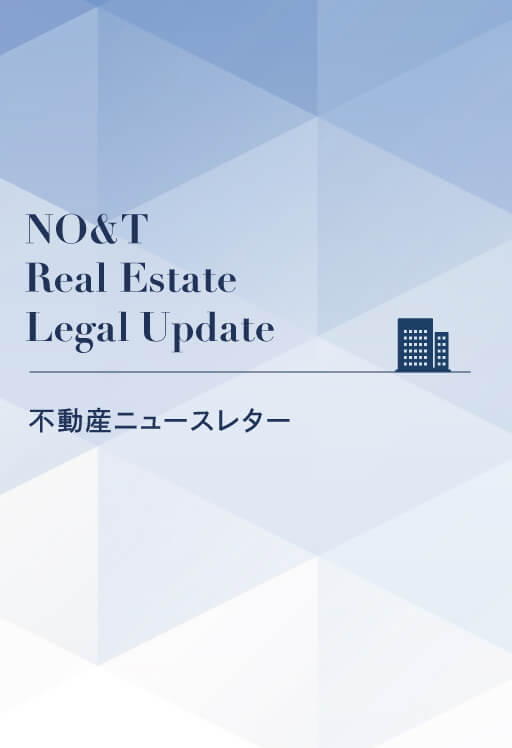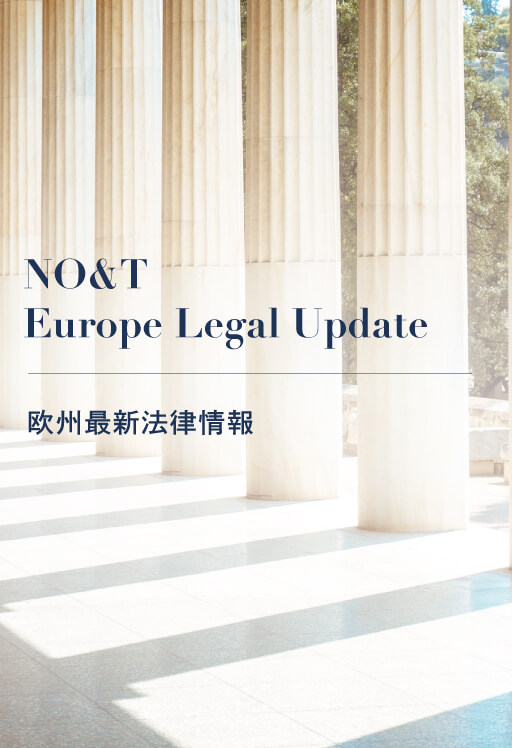
NO&T Real Estate Legal Update
This article is also available in Japanese.
On September 20, 2022, the Act on the Review and Regulation of the Use of Real Estate Surrounding Important Facilities and on Remote Territorial Islands (Act No. 84 of 2021) (the “Act on Review of Important Real Estate”) went into full effect. The Act establishes regulations governing the ownership and use of land on remote territorial islands and around defense facilities where there are recognized national security concerns. The Act on Review of Important Real Estate was recently updated by the third public notice※1 on the designation of monitored areas and special monitored areas (the "Public Notice"), promulgated on December 11, 2023, and effective January 15, 2024.
With the Public Notice, new monitored areas have been designated pursuant to the Act on Review of Important Real Estate, including those in major cities such as the three major metropolitan areas (Capital-region, Chukyo-region, and Kinki-region) and their surrounding areas. With the designation of monitored areas in the 23 wards of Tokyo, including Chiyoda and Shinjuku wards, the need to pay attention to the Act on Review of Important Real Estate has become even more important for real estate transactions in central Tokyo. In this newsletter, we give an outline of the Act on Review of Important Real Estate, the areas in the 23 wards of Tokyo newly added to the monitored areas and relevant points to keep in mind in real estate transactions.
The Act on Review of Important Real Estate designates certain areas of national security importance, such as defense facilities, remote territorial islands and other important areas, as monitored areas. In the event the Japanese government determines that a property owner in a monitored area is engaged in activities of national security concern, it may implement certain measures, such as ordering cessation of use by the owner. Moreover, land transfers in some monitored areas, where the size of the land or buildings to be transferred passes a certain threshold, must notify the Prime Minister in advance of the transfer.
It should be noted that unlike investment management under the Foreign Exchange and Foreign Trade Act, which imposes restrictions on foreign investors, even Japanese nationals and Japanese corporations may be subject to this prior notification obligation if the requirements of the Act on Review of Important Real Estate are met.
The following is the outline of the designated areas and framework for review and regulation under the Act.
An area falls within a "monitored area" if it is within a range of approximately 1,000 meters of important facilities (i.e., defense facilities, facilities of the Japan Coast Guard and facilities supporting the public※2) or within remote territorial islands, and it is particularly necessary to prevent the use of real estate in those monitored areas where such use impedes the functions of the important facilities and remote territorial islands (such use is hereinafter referred to as a “function-impeding act※3”) (Article 5, paragraph 1). A “special monitored area” designates a monitored area where the function of important facilities, or, where applicable, the use of remote territorial islands, is particularly important or vulnerable, and not susceptible of easy substitution or replacement (Article 12, paragraph 1). When monitored areas or special monitored areas are designated, the fact and the designated areas are made public in the Official Gazette※4 (Article 5, paragraph 3 and Article 12, paragraph 3).
In order to prevent the use of real estate as a function-impending act in monitored areas or special monitored areas, such real estate is subject to review of use※5 (Article 6). In addition, when necessary for review of the use of real estate, the Japanese government may ask relevant administrative agencies and other authorities to provide the names, addresses, and other information from users and related parties of the relevant real estate (land users, etc.) (Article 7) and may request land users, etc. to provide certain reports or materials (Article 8).
When concluding a contract for the transfer or creation of certain direct or any indirect ownership rights in real estate (real estate ownership right) (see applicable contracts below) located in special monitored areas and having an area of 200 square meters or more, the parties to the contract are required to notify the Prime Minister in advance (Article 13, paragraphs 1 and 3).
Such contracts or transfers include contracts for sale and purchase, gift, exchange, and assignment, etc. of options (e.g., a purchase option and buy-back option), but do not include creation or transfer of mortgage or leasehold interests. A person who fails to notify despite the obligation to submit the notification, or makes a false notification, is subject to imprisonment for not more than six months or a fine not exceeding 1,000,000 yen (Article 26).
If function-impeding acts are conducted using Real Estate in monitored areas or special monitored areas, the Prime Minister may recommend or order that the user take certain necessary measures (Article 9). In cases where, as the result of such an order, the ordered party is forced to incur or cause another party to incur a monetary loss, compensation will be made by the Japanese government to the extent of "the amount of loss that would normally occur."
Of the 23 wards of Tokyo, the areas surrounding the Ministry of Defense Ichigaya Building (Chiyoda and Shinjuku wards), JGSDF Ground Material Control Command (Kita and Itabashi wards), and JGSDF Camp Nerima (Itabashi and Nerima wards) have been newly designated as monitored areas by Public Notice. In addition, the area around JASDF Fuchu Base (Fuchu City and Koganei City) in Tokyo is also designated as a monitored area.
Since these areas are not designated as special monitored areas, prior notification is not required for sale and purchase of real estate. Such notification may be necessary, however, if these areas are designated as special monitored areas in the future. Thus, it has become increasingly important to pay attention to the Act on Review of Important Real Estate in central Tokyo, and it is necessary to continue to monitor trends in the addition and modification of designated areas by public notice.
*1
Cabinet Office notice No. 126 (December 11, 2023):https://www.cao.go.jp/tochi-chosa/doc/kokuji-126.pdf (Japanese text only)
*2
Nuclear facilities and airports are designated for facilities supporting the public by Cabinet Order as facilities used to support the lives of the public, which could cause serious damage to the lives, physical well-being, or property of the public if acts that impede their functions were carried out.
*3
According to the Basic Policy approved by the Cabinet on September 16, 2022, function-impeding acts include, among other acts, the installation of structures that interfere with the takeoff and landing of aircraft of Self-Defense Forces, and the installation of structures that interfere with the operation of the radar of the Self-Defense Forces though other function-impeding acts are also assumed.
*4
Lists of monitored areas and special monitored areas are available on the Cabinet Office website.
*5
The review is conducted basically by collection of public registers (real estate register, basic resident register, etc.) and, if necessary, by an appropriate combination of on-site surveys and submission of reports or materials from users of relevant real estate and other related parties.
This newsletter is given as general information for reference purposes only and therefore does not constitute our firm’s legal advice. Any opinion stated in this newsletter is a personal view of the author(s) and not our firm’s official view. For any specific matter or legal issue, please do not rely on this newsletter but make sure to consult a legal adviser. We would be delighted to answer your questions, if any.


Masato Kumeuchi, Kodai Ebihara (Co-author)


Hoai Tran


Makoto Saito, Shinichiro Horaguchi, Yoshihisa Watanabe, Ramsay Randall (Co-author)


Makoto Saito, Shinichiro Horaguchi, Yoshihisa Watanabe, Ramsay Randall (Co-author)


Masato Kumeuchi, Kodai Ebihara (Co-author)


Hoai Tran


Makoto Saito, Shinichiro Horaguchi, Yoshihisa Watanabe, Ramsay Randall (Co-author)


Makoto Saito, Shinichiro Horaguchi, Yoshihisa Watanabe, Ramsay Randall (Co-author)


Masato Kumeuchi, Kodai Ebihara (Co-author)


Hoai Tran


Makoto Saito, Shinichiro Horaguchi, Yoshihisa Watanabe, Ramsay Randall (Co-author)


Makoto Saito, Shinichiro Horaguchi, Yoshihisa Watanabe, Ramsay Randall (Co-author)


Patricia O. Ko


Yuan Yao Lee


Yusei Uji


Shunsuke Minowa, Poonyisa Sornchangwat (Co-author)


Patricia O. Ko


Yuan Yao Lee


Yusei Uji


Shunsuke Minowa, Poonyisa Sornchangwat (Co-author)


Supasit Boonsanong, Thananya Pholchaniko, Phareeya Yongpanich (Co-author)


Ngoc Hoang


(February 2025)
Oki Osawa (Comments)


Axel Kuhlmann, Makoto Ohnuma, Shejal Verma, Sofía Terol Cháfer (Uría Menéndez) (Co-author)